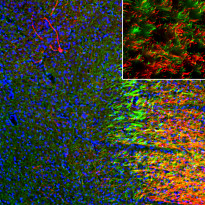ARG11146
anti-Serotonin Transporter antibody
anti-Serotonin Transporter antibody for IHC-Frozen sections and Human,Mouse,Rat,Cow
Overview
| Product Description | Rabbit Polyclonal antibody recognizes Serotonin Transporter |
|---|---|
| Tested Reactivity | Hu, Ms, Rat, Cow |
| Tested Application | IHC-Fr |
| Host | Rabbit |
| Clonality | Polyclonal |
| Isotype | IgG |
| Target Name | Serotonin Transporter |
| Antigen Species | Human |
| Immunogen | KLH-conjugated synthetic peptide of Human Serotonin Transporter. (KSITPETPTEIPCGDIRLNAV) |
| Conjugation | Un-conjugated |
| Alternate Names | SERT; 5HTT; SERT1; Sodium-dependent serotonin transporter; hSERT; 5-HTTLPR; Solute carrier family 6 member 4; HTT; 5-HTT; 5HT transporter; OCD1 |
Application Instructions
| Application Suggestion |
|
||||
|---|---|---|---|---|---|
| Application Note | * The dilutions indicate recommended starting dilutions and the optimal dilutions or concentrations should be determined by the scientist. |
Properties
| Form | Liquid |
|---|---|
| Purification | Affinity purified. |
| Buffer | PBS, 5 mM Sodium azide and 50% Glycerol. |
| Preservative | 5 mM Sodium azide |
| Stabilizer | 50% Glycerol |
| Concentration | 1 mg/ml |
| Storage Instruction | For continuous use, store undiluted antibody at 2-8°C for up to a week. For long-term storage, aliquot and store at -20°C. Storage in frost free freezers is not recommended. Avoid repeated freeze/thaw cycles. Suggest spin the vial prior to opening. The antibody solution should be gently mixed before use. |
| Note | For laboratory research only, not for drug, diagnostic or other use. |
Bioinformation
| Database Links | |
|---|---|
| Gene Symbol | SLC6A4 |
| Gene Full Name | solute carrier family 6 (neurotransmitter transporter), member 4 |
| Background | This gene encodes an integral membrane protein that transports the neurotransmitter serotonin from synaptic spaces into presynaptic neurons. The encoded protein terminates the action of serotonin and recycles it in a sodium-dependent manner. This protein is a target of psychomotor stimulants, such as amphetamines and cocaine, and is a member of the sodium:neurotransmitter symporter family. A repeat length polymorphism in the promoter of this gene has been shown to affect the rate of serotonin uptake. There have been conflicting results in the literature about the possible effect, if any, that this polymorphism may play in behavior and depression. [provided by RefSeq, May 2019] |
| Function | Serotonin transporter whose primary function in the central nervous system involves the regulation of serotonergic signaling via transport of serotonin molecules from the synaptic cleft back into the pre-synaptic terminal for re-utilization. Plays a key role in mediating regulation of the availability of serotonin to other receptors of serotonergic systems. Terminates the action of serotonin and recycles it in a sodium-dependent manner. [UniProt] |
| Cellular Localization | Cell membrane; Multi-pass membrane protein. Endomembrane system; Multi-pass membrane protein. Endosome membrane; Multi-pass membrane protein. Note=Could be part of recycling endosomes (PubMed:18227069, PubMed:16870614). Density of transporter molecules on the plasma membrane is itself regulated by STX1A (By similarity). Density of transporter molecules on the plasma membrane is also regulated by serotonin (PubMed:17506858) (PubMed:18227069). [UniProt] |
| Calculated MW | 70 kDa |
| PTM | Glycosylated; modification with sialylated N-glycans is a requirement for transporters to associate with each other and to function as homooligomeric forms. Phosphorylation at Thr-276 increases 5-HT uptake and is required for cGMP-mediated SERT regulation. Phosphorylation upon PKC stimulation modifies the SERT distribution and density in the membrane, and diminishes the uptake capacity. [UniProt] |
Images (1) Click the Picture to Zoom In
-
ARG11146 anti-Serotonin Transporter antibody IHC-Fr image
Immunohistochemistry: Frozen section of Rat brain tissue stained with ARG11146 anti-Serotonin Transporter antibody (green), and co-stained with ARG11150 anti-Tyrosine Hydroxylase antibody (red). The blue stain reveals DNA in cell nuclei.






